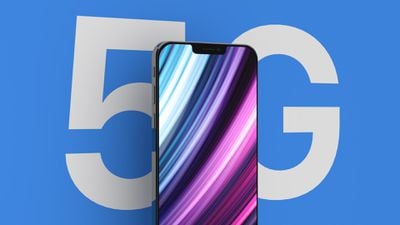Apple's 2020 iPhone lineup will feature 5G support for the first time, and several rumors have suggested that the new iPhones coming this year are expected to support both sub-6GHz and mmWave networks, which are two different 5G technologies that carriers are rolling out.

mmWave, the fastest 5G technology, will be used in dense urban areas like major cities, while sub-6GHz networks will be available more broadly in suburban and urban areas. Sub-6GHz technology is faster than 4G, but not as fast as mmWave and not responsible for some of the blazing fast speeds advertised when companies talk about 5G technology.
DigiTimes is out today with a new preliminary report that indicates all 2020 iPhones will feature support for mmWave and sub-6GHz networks, but suggests Apple will take a different approach in 2021.
Some of the 2021 iPhone models may feature single 5G band support, working on either mmWave or sub-6GHz networks, but not both.
Apple's 2020 series of iPhones will work on both sub-6GHz and millimeter wave 5G networks, and the vendor is considering introducing its iPhones supporting either mmWave or sub-6GHz for specific markets next year, according to industry sources in Taiwan.
The iPhones with limited support would be introduced in specific markets where one technology is more predominantly used than the other. Some countries, for example, will not have support for mmWave networks, which makes the inclusion of mmWave support less important and could cut down on modem costs for future iPhones.
There have been some 2020 iPhone rumors, including from reliable Apple analyst Ming-Chi Kuo, that have suggested Apple's iPhone 12 lineup will also feature devices that may not have mmWave support enabled in some countries.
All of the 2020 iPhones are expected to have the same modem hardware that supports all 5G bands, but Apple could disable mmWave in countries where it is not operational or turn off 5G entirely in countries without 5G networks to reduce its production costs as antennas are required to work with the modem hardware.
DigiTimes' report suggests that the 2021 iPhones could perhaps have different hardware that only supports one network, rather than Apple disabling hardware, but we'll have to wait to see what happens with the 2020 iPhones to get a better picture of what we can expect for the 2021 iPhone lineup as the rumors about which iPhones will support which networks are somewhat confusing at this time.
DigiTimes' report today is a preliminary report and it will be updated with more information in the future, and if there's more detail to include, we'll update this article. For more on what to expect from the 2020 iPhone lineup, make sure to check out our iPhone 12 roundup.
























